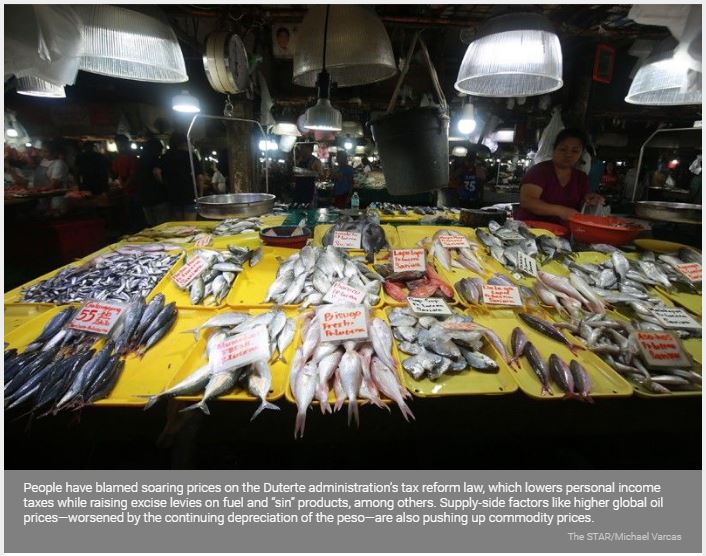Philippines: Nomura sees 50-basis point rise in interest rates in August
MANILA, Philippines — The Bangko Sentral ng Pilipinas will likely hike its policy rate again, this time by 50 basis points (bps) instead of the traditional 25 bps adjustment to contain rising inflation and lend some strength to the local currency, analysts from Japanese bank Nomura said.
Central bank Governor Nestor Espenilla last month signaled that monetary authorities are building the case for a third rate hike this year, saying the BSP is considering a “strong follow-through monetary adjustment” next week amid risks posed by “excessive volatility” in foreign exchange markets.
Inflation spiked to a fresh five-year high of 5.2 percent in June from May’s 4.6 percent, putting the year-to-date figure at 4.3 percent, or above the BSP’ 2-4 percent target range. The central bank has responded by delivering back-to-back rate hikes.
In a research note, economists at Nomura said there’s a 70 percent probability that the central bank will raise its benchmark rate by 50 bps and a 30 percent chance of a 25 bps move.
Nomura also expects the policy statement to remain hawkish, with BSP “clearly leaving the door open for further hikes.”
“We put a lot of weight in Governor Espenilla’s comments because he tends to be deliberate in his signals, and, as decisions at the last two meetings demonstrate, there is ultimately follow-through action even though decisions are collective on the part of the monetary board,” the Japanese bank said.
“The drivers of inflation have clearly broadened, which would be seen by BSP as a sign of more second-round effects alongside recent demands for wage and transport fare hikes,” it added.
The BSP’s economic research department forecasts inflation to spike 5.1-5.8 percent in July due to higher prices of electricity, food, fuel and transportation costs. Meanwhile, Nomura projects inflation in July to hit a new peak of 5.6 percent, which would be the highest print since 2009.
People have blamed soaring prices on the Duterte administration’s tax reform law, which raised excise levies on fuel and “sin” products, among others. Supply-side factors like higher global oil prices—exacerbated by the continuing depreciation of the peso—are also pushing up commodity prices.
The peso has weakened by more than 6 percent against the US dollar since the start of the year, making it one of Asia’s worst-performing currencies. Although higher policy rates could help fight outflows, Nomura said weak global risk sentiment poses a headwind.
The BSP’s Monetary Board is scheduled to review policy settings on August 9 a few hours after the Philippine Statistics Authority reports second-quarter gross domestic product growth, which Nomura expects to clock in at 6.8 percent, unchanged from the previous quarter.
The government will release the July inflation data on August 7.
Source: https://www.philstar.com/business/2018/08/02/1839009/nomura-sees-50-basis-point-rise-interest-rates-august#OlzjAyRux6LJmvMg.99


 Thailand
Thailand




